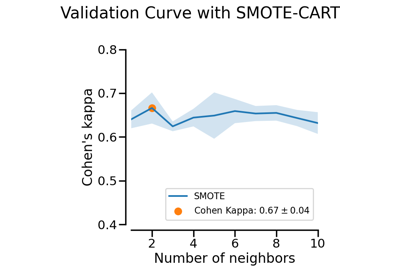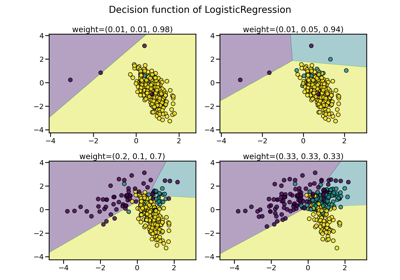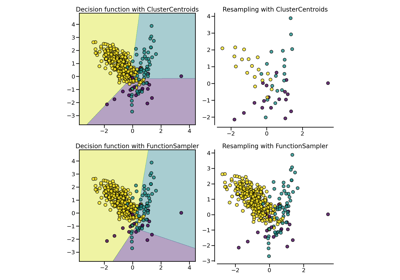Pipeline#
- class imblearn.pipeline.Pipeline(steps, *, transform_input=None, memory=None, verbose=False)[source]#
Pipeline of transforms and resamples with a final estimator.
Sequentially apply a list of transforms, sampling, and a final estimator. Intermediate steps of the pipeline must be transformers or resamplers, that is, they must implement fit, transform and sample methods. The samplers are only applied during fit. The final estimator only needs to implement fit. The transformers and samplers in the pipeline can be cached using
memoryargument.The purpose of the pipeline is to assemble several steps that can be cross-validated together while setting different parameters. For this, it enables setting parameters of the various steps using their names and the parameter name separated by a ‘__’, as in the example below. A step’s estimator may be replaced entirely by setting the parameter with its name to another estimator, or a transformer removed by setting it to ‘passthrough’ or
None.- Parameters:
- stepslist
List of (name, transform) tuples (implementing fit/transform/fit_resample) that are chained, in the order in which they are chained, with the last object an estimator.
- transform_inputlist of str, default=None
The names of the metadata parameters that should be transformed by the pipeline before passing it to the step consuming it.
This enables transforming some input arguments to
fit(other thanX) to be transformed by the steps of the pipeline up to the step which requires them. Requirement is defined via metadata routing. For instance, this can be used to pass a validation set through the pipeline.You can only set this if metadata routing is enabled, which you can enable using
sklearn.set_config(enable_metadata_routing=True).Added in version 1.6.
- memoryInstance of joblib.Memory or str, default=None
Used to cache the fitted transformers of the pipeline. By default, no caching is performed. If a string is given, it is the path to the caching directory. Enabling caching triggers a clone of the transformers before fitting. Therefore, the transformer instance given to the pipeline cannot be inspected directly. Use the attribute
named_stepsorstepsto inspect estimators within the pipeline. Caching the transformers is advantageous when fitting is time consuming.- verbosebool, default=False
If True, the time elapsed while fitting each step will be printed as it is completed.
- Attributes:
named_stepsBunchAccess the steps by name.
classes_ndarray of shape (n_classes,)The classes labels.
n_features_in_intNumber of features seen during first step
fitmethod.feature_names_in_ndarray of shape (n_features_in_,)Names of features seen during first step
fitmethod.
See also
make_pipelineHelper function to make pipeline.
Notes
See Usage of pipeline embedding samplers
Warning
A surprising behaviour of the
imbalanced-learnpipeline is that it breaks thescikit-learncontract where one expectsestimmator.fit_transform(X, y)to be equivalent toestimator.fit(X, y).transform(X).The semantic of
fit_resampleis to be applied only during the fit stage. Therefore, resampling will happen when callingfit_transformwhile it will only happen on thefitstage when callingfitandtransformseparately. Practically,fit_transformwill lead to a resampled dataset whilefitandtransformwill not.Examples
>>> from collections import Counter >>> from sklearn.datasets import make_classification >>> from sklearn.model_selection import train_test_split as tts >>> from sklearn.decomposition import PCA >>> from sklearn.neighbors import KNeighborsClassifier as KNN >>> from sklearn.metrics import classification_report >>> from imblearn.over_sampling import SMOTE >>> from imblearn.pipeline import Pipeline >>> X, y = make_classification(n_classes=2, class_sep=2, ... weights=[0.1, 0.9], n_informative=3, n_redundant=1, flip_y=0, ... n_features=20, n_clusters_per_class=1, n_samples=1000, random_state=10) >>> print(f'Original dataset shape {Counter(y)}') Original dataset shape Counter({1: 900, 0: 100}) >>> pca = PCA() >>> smt = SMOTE(random_state=42) >>> knn = KNN() >>> pipeline = Pipeline([('smt', smt), ('pca', pca), ('knn', knn)]) >>> X_train, X_test, y_train, y_test = tts(X, y, random_state=42) >>> pipeline.fit(X_train, y_train) Pipeline(...) >>> y_hat = pipeline.predict(X_test) >>> print(classification_report(y_test, y_hat)) precision recall f1-score support 0 0.87 1.00 0.93 26 1 1.00 0.98 0.99 224 accuracy 0.98 250 macro avg 0.93 0.99 0.96 250 weighted avg 0.99 0.98 0.98 250
Methods
decision_function(X, **params)Transform the data, and apply
decision_functionwith the final estimator.fit(X[, y])Fit the model.
fit_predict(X[, y])Apply
fit_predictof last step in pipeline after transforms.fit_resample(X[, y])Fit the model and sample with the final estimator.
fit_transform(X[, y])Fit the model and transform with the final estimator.
get_feature_names_out([input_features])Get output feature names for transformation.
Get metadata routing of this object.
get_params([deep])Get parameters for this estimator.
inverse_transform(Xt, **params)Apply
inverse_transformfor each step in a reverse order.predict(X, **params)Transform the data, and apply
predictwith the final estimator.predict_log_proba(X, **params)Transform the data, and apply
predict_log_probawith the final estimator.predict_proba(X, **params)Transform the data, and apply
predict_probawith the final estimator.score(X[, y, sample_weight])Transform the data, and apply
scorewith the final estimator.Transform the data, and apply
score_sampleswith the final estimator.set_output(*[, transform])Set the output container when
"transform"and"fit_transform"are called.set_params(**kwargs)Set the parameters of this estimator.
set_score_request(*[, sample_weight])Configure whether metadata should be requested to be passed to the
scoremethod.transform(X, **params)Transform the data, and apply
transformwith the final estimator.- property classes_#
The classes labels. Only exist if the last step is a classifier.
- decision_function(X, **params)[source]#
Transform the data, and apply
decision_functionwith the final estimator.Call
transformof each transformer in the pipeline. The transformed data are finally passed to the final estimator that callsdecision_functionmethod. Only valid if the final estimator implementsdecision_function.- Parameters:
- Xiterable
Data to predict on. Must fulfill input requirements of first step of the pipeline.
- **paramsdict of string -> object
Parameters requested and accepted by steps. Each step must have requested certain metadata for these parameters to be forwarded to them.
Added in version 1.4: Only available if
enable_metadata_routing=True. See Metadata Routing User Guide for more details.
- Returns:
- y_scorendarray of shape (n_samples, n_classes)
Result of calling
decision_functionon the final estimator.
- property feature_names_in_#
Names of features seen during first step
fitmethod.
- fit(X, y=None, **params)[source]#
Fit the model.
Fit all the transforms/samplers one after the other and transform/sample the data, then fit the transformed/sampled data using the final estimator.
- Parameters:
- Xiterable
Training data. Must fulfill input requirements of first step of the pipeline.
- yiterable, default=None
Training targets. Must fulfill label requirements for all steps of the pipeline.
- **paramsdict of str -> object
If
enable_metadata_routing=False(default):Parameters passed to the
fitmethod of each step, where each parameter name is prefixed such that parameterpfor stepshas keys__p.If
enable_metadata_routing=True:Parameters requested and accepted by steps. Each step must have requested certain metadata for these parameters to be forwarded to them.
Changed in version 1.4: Parameters are now passed to the
transformmethod of the intermediate steps as well, if requested, and ifenable_metadata_routing=Trueis set viaset_config.See Metadata Routing User Guide for more details.
- Returns:
- selfPipeline
This estimator.
- fit_predict(X, y=None, **params)[source]#
Apply
fit_predictof last step in pipeline after transforms.Applies fit_transforms of a pipeline to the data, followed by the fit_predict method of the final estimator in the pipeline. Valid only if the final estimator implements fit_predict.
- Parameters:
- Xiterable
Training data. Must fulfill input requirements of first step of the pipeline.
- yiterable, default=None
Training targets. Must fulfill label requirements for all steps of the pipeline.
- **paramsdict of str -> object
If
enable_metadata_routing=False(default):Parameters to the
predictcalled at the end of all transformations in the pipeline.If
enable_metadata_routing=True:Parameters requested and accepted by steps. Each step must have requested certain metadata for these parameters to be forwarded to them.
Added in version 0.20.
Changed in version 1.4: Parameters are now passed to the
transformmethod of the intermediate steps as well, if requested, and ifenable_metadata_routing=True.See Metadata Routing User Guide for more details.
Note that while this may be used to return uncertainties from some models with
return_stdorreturn_cov, uncertainties that are generated by the transformations in the pipeline are not propagated to the final estimator.
- Returns:
- y_predndarray of shape (n_samples,)
The predicted target.
- fit_resample(X, y=None, **params)[source]#
Fit the model and sample with the final estimator.
Fits all the transformers/samplers one after the other and transform/sample the data, then uses fit_resample on transformed data with the final estimator.
- Parameters:
- Xiterable
Training data. Must fulfill input requirements of first step of the pipeline.
- yiterable, default=None
Training targets. Must fulfill label requirements for all steps of the pipeline.
- **paramsdict of str -> object
If
enable_metadata_routing=False(default):Parameters passed to the
fitmethod of each step, where each parameter name is prefixed such that parameterpfor stepshas keys__p.If
enable_metadata_routing=True:Parameters requested and accepted by steps. Each step must have requested certain metadata for these parameters to be forwarded to them.
Changed in version 1.4: Parameters are now passed to the
transformmethod of the intermediate steps as well, if requested, and ifenable_metadata_routing=True.See Metadata Routing User Guide for more details.
- Returns:
- Xtarray-like of shape (n_samples, n_transformed_features)
Transformed samples.
- ytarray-like of shape (n_samples, n_transformed_features)
Transformed target.
- fit_transform(X, y=None, **params)[source]#
Fit the model and transform with the final estimator.
Fits all the transformers/samplers one after the other and transform/sample the data, then uses fit_transform on transformed data with the final estimator.
- Parameters:
- Xiterable
Training data. Must fulfill input requirements of first step of the pipeline.
- yiterable, default=None
Training targets. Must fulfill label requirements for all steps of the pipeline.
- **paramsdict of str -> object
If
enable_metadata_routing=False(default):Parameters passed to the
fitmethod of each step, where each parameter name is prefixed such that parameterpfor stepshas keys__p.If
enable_metadata_routing=True:Parameters requested and accepted by steps. Each step must have requested certain metadata for these parameters to be forwarded to them.
Changed in version 1.4: Parameters are now passed to the
transformmethod of the intermediate steps as well, if requested, and ifenable_metadata_routing=True.See Metadata Routing User Guide for more details.
- Returns:
- Xtarray-like of shape (n_samples, n_transformed_features)
Transformed samples.
- get_feature_names_out(input_features=None)[source]#
Get output feature names for transformation.
Transform input features using the pipeline.
- Parameters:
- input_featuresarray-like of str or None, default=None
Input features.
- Returns:
- feature_names_outndarray of str objects
Transformed feature names.
- get_metadata_routing()[source]#
Get metadata routing of this object.
Please check User Guide on how the routing mechanism works.
- Returns:
- routingMetadataRouter
A
MetadataRouterencapsulating routing information.
- get_params(deep=True)[source]#
Get parameters for this estimator.
Returns the parameters given in the constructor as well as the estimators contained within the
stepsof thePipeline.- Parameters:
- deepbool, default=True
If True, will return the parameters for this estimator and contained subobjects that are estimators.
- Returns:
- paramsmapping of string to any
Parameter names mapped to their values.
- inverse_transform(Xt, **params)[source]#
Apply
inverse_transformfor each step in a reverse order.All estimators in the pipeline must support
inverse_transform.- Parameters:
- Xtarray-like of shape (n_samples, n_transformed_features)
Data samples, where
n_samplesis the number of samples andn_featuresis the number of features. Must fulfill input requirements of last step of pipeline’sinverse_transformmethod.- **paramsdict of str -> object
Parameters requested and accepted by steps. Each step must have requested certain metadata for these parameters to be forwarded to them.
Added in version 1.4: Only available if
enable_metadata_routing=True. See Metadata Routing User Guide for more details.
- Returns:
- Xtndarray of shape (n_samples, n_features)
Inverse transformed data, that is, data in the original feature space.
- property n_features_in_#
Number of features seen during first step
fitmethod.
- property named_steps#
Access the steps by name.
Read-only attribute to access any step by given name. Keys are steps names and values are the steps objects.
- predict(X, **params)[source]#
Transform the data, and apply
predictwith the final estimator.Call
transformof each transformer in the pipeline. The transformed data are finally passed to the final estimator that callspredictmethod. Only valid if the final estimator implementspredict.- Parameters:
- Xiterable
Data to predict on. Must fulfill input requirements of first step of the pipeline.
- **paramsdict of str -> object
If
enable_metadata_routing=False(default):Parameters to the
predictcalled at the end of all transformations in the pipeline.If
enable_metadata_routing=True:Parameters requested and accepted by steps. Each step must have requested certain metadata for these parameters to be forwarded to them.
Added in version 0.20.
Changed in version 1.4: Parameters are now passed to the
transformmethod of the intermediate steps as well, if requested, and ifenable_metadata_routing=Trueis set viaset_config.See Metadata Routing User Guide for more details.
Note that while this may be used to return uncertainties from some models with
return_stdorreturn_cov, uncertainties that are generated by the transformations in the pipeline are not propagated to the final estimator.
- Returns:
- y_predndarray
Result of calling
predicton the final estimator.
- predict_log_proba(X, **params)[source]#
Transform the data, and apply
predict_log_probawith the final estimator.Call
transformof each transformer in the pipeline. The transformed data are finally passed to the final estimator that callspredict_log_probamethod. Only valid if the final estimator implementspredict_log_proba.- Parameters:
- Xiterable
Data to predict on. Must fulfill input requirements of first step of the pipeline.
- **paramsdict of str -> object
If
enable_metadata_routing=False(default):Parameters to the
predict_log_probacalled at the end of all transformations in the pipeline.If
enable_metadata_routing=True:Parameters requested and accepted by steps. Each step must have requested certain metadata for these parameters to be forwarded to them.
Added in version 0.20.
Changed in version 1.4: Parameters are now passed to the
transformmethod of the intermediate steps as well, if requested, and ifenable_metadata_routing=True.See Metadata Routing User Guide for more details.
- Returns:
- y_log_probandarray of shape (n_samples, n_classes)
Result of calling
predict_log_probaon the final estimator.
- predict_proba(X, **params)[source]#
Transform the data, and apply
predict_probawith the final estimator.Call
transformof each transformer in the pipeline. The transformed data are finally passed to the final estimator that callspredict_probamethod. Only valid if the final estimator implementspredict_proba.- Parameters:
- Xiterable
Data to predict on. Must fulfill input requirements of first step of the pipeline.
- **paramsdict of str -> object
If
enable_metadata_routing=False(default):Parameters to the
predict_probacalled at the end of all transformations in the pipeline.If
enable_metadata_routing=True:Parameters requested and accepted by steps. Each step must have requested certain metadata for these parameters to be forwarded to them.
Added in version 0.20.
Changed in version 1.4: Parameters are now passed to the
transformmethod of the intermediate steps as well, if requested, and ifenable_metadata_routing=True.See Metadata Routing User Guide for more details.
- Returns:
- y_probandarray of shape (n_samples, n_classes)
Result of calling
predict_probaon the final estimator.
- score(X, y=None, sample_weight=None, **params)[source]#
Transform the data, and apply
scorewith the final estimator.Call
transformof each transformer in the pipeline. The transformed data are finally passed to the final estimator that callsscoremethod. Only valid if the final estimator implementsscore.- Parameters:
- Xiterable
Data to predict on. Must fulfill input requirements of first step of the pipeline.
- yiterable, default=None
Targets used for scoring. Must fulfill label requirements for all steps of the pipeline.
- sample_weightarray-like, default=None
If not None, this argument is passed as
sample_weightkeyword argument to thescoremethod of the final estimator.- **paramsdict of str -> object
Parameters requested and accepted by steps. Each step must have requested certain metadata for these parameters to be forwarded to them.
Added in version 1.4: Only available if
enable_metadata_routing=True. See Metadata Routing User Guide for more details.
- Returns:
- scorefloat
Result of calling
scoreon the final estimator.
- score_samples(X)[source]#
Transform the data, and apply
score_sampleswith the final estimator.Call
transformof each transformer in the pipeline. The transformed data are finally passed to the final estimator that callsscore_samplesmethod. Only valid if the final estimator implementsscore_samples.- Parameters:
- Xiterable
Data to predict on. Must fulfill input requirements of first step of the pipeline.
- Returns:
- y_scorendarray of shape (n_samples,)
Result of calling
score_sampleson the final estimator.
- set_output(*, transform=None)[source]#
Set the output container when
"transform"and"fit_transform"are called.Calling
set_outputwill set the output of all estimators insteps.- Parameters:
- transform{“default”, “pandas”, “polars”}, default=None
Configure output of
transformandfit_transform."default": Default output format of a transformer"pandas": DataFrame output"polars": Polars outputNone: Transform configuration is unchanged
Added in version 1.4:
"polars"option was added.
- Returns:
- selfestimator instance
Estimator instance.
- set_params(**kwargs)[source]#
Set the parameters of this estimator.
Valid parameter keys can be listed with
get_params(). Note that you can directly set the parameters of the estimators contained insteps.- Parameters:
- **kwargsdict
Parameters of this estimator or parameters of estimators contained in
steps. Parameters of the steps may be set using its name and the parameter name separated by a ‘__’.
- Returns:
- selfobject
Pipeline class instance.
- set_score_request(*, sample_weight: bool | None | str = '$UNCHANGED$') Pipeline[source]#
Configure whether metadata should be requested to be passed to the
scoremethod.Note that this method is only relevant when this estimator is used as a sub-estimator within a meta-estimator and metadata routing is enabled with
enable_metadata_routing=True(seesklearn.set_config). Please check the User Guide on how the routing mechanism works.The options for each parameter are:
True: metadata is requested, and passed toscoreif provided. The request is ignored if metadata is not provided.False: metadata is not requested and the meta-estimator will not pass it toscore.None: metadata is not requested, and the meta-estimator will raise an error if the user provides it.str: metadata should be passed to the meta-estimator with this given alias instead of the original name.
The default (
sklearn.utils.metadata_routing.UNCHANGED) retains the existing request. This allows you to change the request for some parameters and not others.Added in version 1.3.
- Parameters:
- sample_weightstr, True, False, or None, default=sklearn.utils.metadata_routing.UNCHANGED
Metadata routing for
sample_weightparameter inscore.
- Returns:
- selfobject
The updated object.
- transform(X, **params)[source]#
Transform the data, and apply
transformwith the final estimator.Call
transformof each transformer in the pipeline. The transformed data are finally passed to the final estimator that callstransformmethod. Only valid if the final estimator implementstransform.This also works where final estimator is
Nonein which case all prior transformations are applied.- Parameters:
- Xiterable
Data to transform. Must fulfill input requirements of first step of the pipeline.
- **paramsdict of str -> object
Parameters requested and accepted by steps. Each step must have requested certain metadata for these parameters to be forwarded to them.
Added in version 1.4: Only available if
enable_metadata_routing=True. See Metadata Routing User Guide for more details.
- Returns:
- Xtndarray of shape (n_samples, n_transformed_features)
Transformed data.
Examples using imblearn.pipeline.Pipeline#
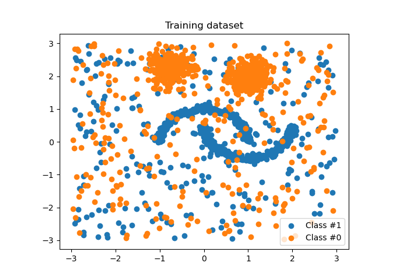
Customized sampler to implement an outlier rejections estimator
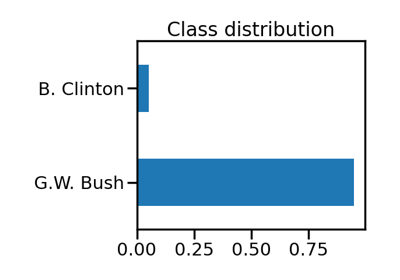
Benchmark over-sampling methods in a face recognition task

Fitting model on imbalanced datasets and how to fight bias
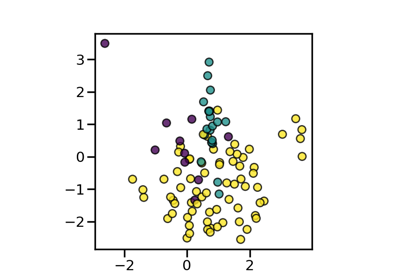
Compare sampler combining over- and under-sampling







